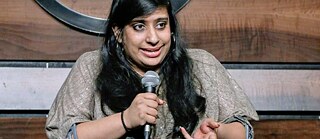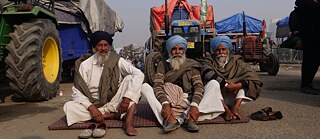Comedy Against the Standstill of Life
No Inspiration Zone
Pune-based advocate for disability inclusion, writer, and stand-up comedian Sweta Mantrii was born with spina bifida. She talks about how she leans on comedy to overcome the still moments in her life.
“There’s a running joke in my family, and it’s not me,” reads Sweta Mantrii’s WhatsApp status. The 34-year-old advocate for disability inclusion, writer, and stand-up comedian uses self-deprecating humor like this to make light of her situation. “Well, it is interrelated,” she says. “I use humor to overcome the darkness of my reality, the unfair nature of life, and, the lack of social justice, maybe.”
Mantrii was born with spina bifida (a birth defect that occurs when the spine and spinal cord don’t form properly). She uses the help of comedy — along with crutches — to navigate her way through life.
Also an MBA graduate, Mantrii produced her first short film in 2015, which highlighted the reality of living with a disability. “We covered various topics in the film, including education, sexuality, and infrastructure. The tone was matter-of-fact. For example, we documented the famous Goodluck Café in Pune. I shared how it doesn’t have a washroom or proper access, so I am unable to hang out there,” she says. “But the film received a mixed response and some serious backlash — I had people telling me if I can afford to go to a better coffee shop, why am I complaining about not being able to access an Iranian café — and that upset me a lot because, at the end of the day, it’s my choice.”
Mantrii’s subject matter ranges from performing daily chores to traversing dating life. Through comedy, Mantrii, by her own admission, “can say things on stage that [she] can’t say in person.” “I am also able to tackle psychological barriers and conditioning people have — like if I see a disabled person crossing the road, I have to go help,” she points out.
Incidentally, the year Mantrii’s film was released was also the year that India’s Prime Minister Narendra Modi said in his Mann ki Baat (an Indian radio program) address that people with disabilities should now be referred to as “divyang” or “divyangjan,” a Hindi word meaning “the one with a divine body part.” Mantrii is rather uncomfortable adapting to the moniker. She firmly believes that disability isn’t a problem, “accessibility, or the lack thereof, is.”
She recalls an incident that happened a while ago when she was denied entry to a nightclub in Pune. Owing to its dim lighting, the management didn’t want to take responsibility for her entering the club. But incidents like these happened throughout her childhood. “I attended a regular school and during the physical training (PT) class, me and another girl with a similar condition were told to sit in the classroom, even though at home, my parents allowed me to go down and play with other children. Likewise, during lunch hours, we weren’t allowed to go to the ground,” she shares. “The school even appointed a full-time helper for us, and when she failed to turn up, we were sent home for the day until we were in the seventh grade.”
The medical understanding of disability says disability is a problem. “But the social view of disability says the society that fails to accommodate disability is the problem,” says Mantrii. “I now know that I am worthy.”
And Mantrii won’t let people “inspiration-zone” her. “People call me ‘inspiring’ because I am doing something and leading a fulfilling life despite my so-called barriers,” she explains. “But that just means that they are focussing more on my strength than acknowledging my barriers. We want to break those barriers, and I won’t be subjected to inspiration porn.” Mantrii is not trying to be inspiring, she insists. “I am just doing what I have to do to get to where I have to. People use the term so casually. We are all real, flawed humans, and that’s how the world should see me, like the rest,” she says.
Today, the pandemic has forced large business conglomerates to consider a “work-from-home” (WFH) option. “But that was never an option for me when I started looking for jobs. Almost a decade ago, I chose a freelance, WFH life because most companies aren’t accessible enough,” she rues. “For me, this was the only way. I take up writing projects, and since 2018, I have been working on my show, With This Ability.”
In December 2020, Mantrii moved out of her parents’ nest. “This was on my mind for a while. But things got pushed back because of the pandemic. After the first wave, a friend told me there was a vacancy in her flat, and I decided to take the plunge. Mum was fine with it, but dad was a bit apprehensive,” she says. Living on your own gives you several liberties, but it is also, “exhausting and time-consuming in a different way.” “Back home, my parents did everything. My mum would help make tasks less tiresome. It took me a while to get used to a new routine. I moved to a new place again in April 2021. We now have someone who comes in to cook and clean. Over time, I have developed some hacks to navigate and figured out my tools. Besides, my parents live half an hour away.”
Though her chartered accountant parents aren’t entirely on board with her choices, they are largely understanding. “The kind of equation I share with them is that I don’t seek permission, I just inform my parents,” she quips. “I think they have come to realize that I am not following a conventional path anyway. As long as it makes me happy, they are fine.”
Mantrii was born with spina bifida (a birth defect that occurs when the spine and spinal cord don’t form properly). She uses the help of comedy — along with crutches — to navigate her way through life.
Also an MBA graduate, Mantrii produced her first short film in 2015, which highlighted the reality of living with a disability. “We covered various topics in the film, including education, sexuality, and infrastructure. The tone was matter-of-fact. For example, we documented the famous Goodluck Café in Pune. I shared how it doesn’t have a washroom or proper access, so I am unable to hang out there,” she says. “But the film received a mixed response and some serious backlash — I had people telling me if I can afford to go to a better coffee shop, why am I complaining about not being able to access an Iranian café — and that upset me a lot because, at the end of the day, it’s my choice.”
Anger and Frustration
Shortly after the incident, Mantrii created a short comedy set to perform before screening her film to lighten the mood. “I performed my first open mic there. In hindsight, it wasn’t my strongest set,” she says. “But over time, I think I have found my voice and tone.”Mantrii’s subject matter ranges from performing daily chores to traversing dating life. Through comedy, Mantrii, by her own admission, “can say things on stage that [she] can’t say in person.” “I am also able to tackle psychological barriers and conditioning people have — like if I see a disabled person crossing the road, I have to go help,” she points out.
Incidentally, the year Mantrii’s film was released was also the year that India’s Prime Minister Narendra Modi said in his Mann ki Baat (an Indian radio program) address that people with disabilities should now be referred to as “divyang” or “divyangjan,” a Hindi word meaning “the one with a divine body part.” Mantrii is rather uncomfortable adapting to the moniker. She firmly believes that disability isn’t a problem, “accessibility, or the lack thereof, is.”
She recalls an incident that happened a while ago when she was denied entry to a nightclub in Pune. Owing to its dim lighting, the management didn’t want to take responsibility for her entering the club. But incidents like these happened throughout her childhood. “I attended a regular school and during the physical training (PT) class, me and another girl with a similar condition were told to sit in the classroom, even though at home, my parents allowed me to go down and play with other children. Likewise, during lunch hours, we weren’t allowed to go to the ground,” she shares. “The school even appointed a full-time helper for us, and when she failed to turn up, we were sent home for the day until we were in the seventh grade.”
Things Were Slow, Almost Humiliating
These moments made Mantrii endure “anger and frustration.” But the real time, when she experienced that her life standing still was when she was between 25 and 30. “It was the age when my peers were all getting married. Up until then, all my big milestones, including education and job were on par with them. In this aspect, I felt I was left behind, and time just stood still,” she says. “So, I asked my parents to look for a match for me. But things were slow, almost humiliating, people asked what all I can do, there was a time when I was told to ‘walk and show,’ and I didn’t want to do that. That was a real low.” Mantrii thought, “I don’t need a caretaker; I want a companion.”The medical understanding of disability says disability is a problem. “But the social view of disability says the society that fails to accommodate disability is the problem,” says Mantrii. “I now know that I am worthy.”
And Mantrii won’t let people “inspiration-zone” her. “People call me ‘inspiring’ because I am doing something and leading a fulfilling life despite my so-called barriers,” she explains. “But that just means that they are focussing more on my strength than acknowledging my barriers. We want to break those barriers, and I won’t be subjected to inspiration porn.” Mantrii is not trying to be inspiring, she insists. “I am just doing what I have to do to get to where I have to. People use the term so casually. We are all real, flawed humans, and that’s how the world should see me, like the rest,” she says.
Welcome to My World
The COVID-19 pandemic that engulfed the world in 2020 and the subsequent lockdown are the only “real lived experiences a non-disabled person has in common with me.” Mantrii speaks about the situation in some of the videos she has uploaded on her social media pages. “People were upset that they couldn’t step out or that they couldn’t leave when they wanted to,” she says. “Welcome to my world. That’s my life every day. Time stood still for the world during the lockdown. But our lockdown will only end when there is better accessibility, right?”Today, the pandemic has forced large business conglomerates to consider a “work-from-home” (WFH) option. “But that was never an option for me when I started looking for jobs. Almost a decade ago, I chose a freelance, WFH life because most companies aren’t accessible enough,” she rues. “For me, this was the only way. I take up writing projects, and since 2018, I have been working on my show, With This Ability.”
In December 2020, Mantrii moved out of her parents’ nest. “This was on my mind for a while. But things got pushed back because of the pandemic. After the first wave, a friend told me there was a vacancy in her flat, and I decided to take the plunge. Mum was fine with it, but dad was a bit apprehensive,” she says. Living on your own gives you several liberties, but it is also, “exhausting and time-consuming in a different way.” “Back home, my parents did everything. My mum would help make tasks less tiresome. It took me a while to get used to a new routine. I moved to a new place again in April 2021. We now have someone who comes in to cook and clean. Over time, I have developed some hacks to navigate and figured out my tools. Besides, my parents live half an hour away.”
Though her chartered accountant parents aren’t entirely on board with her choices, they are largely understanding. “The kind of equation I share with them is that I don’t seek permission, I just inform my parents,” she quips. “I think they have come to realize that I am not following a conventional path anyway. As long as it makes me happy, they are fine.”






